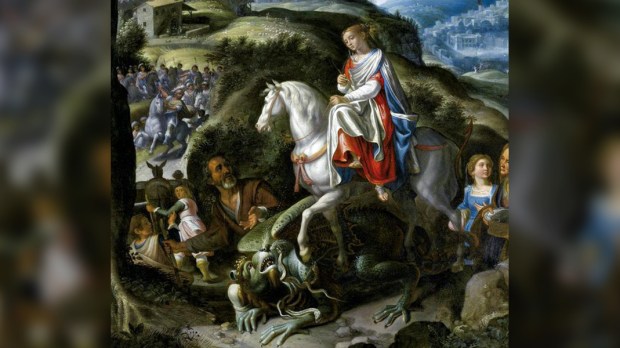Scripture introduces us to many interesting people who later went on to be heroic evangelists. The Bible accounts for some of the travels of the Apostles and their evangelical missions, but for many of the peripheral figures we must search through historical records, tradition, and legends to piece together their life stories.
Of all the people who were changed through their encounters with Christ, it is arguable that the one with the most growth of character was Martha. We first encounter Martha in Luke 10, when Jesus was visiting the house of Lazarus, where he lived with his two sisters Martha and Mary. Martha puts her energy into hospitality for Jesus, while her sister Mary sits at His feet and listens to Christ’s words, without helping her sister.
Martha asks Jesus to tell Mary to help her prepare their meals, but Jesus explains to her that the food of the body is not as important as the food of the soul:
“Martha, Martha, you are anxious and worried about many things. There is need of only one thing. Mary has chosen the better part and it will not be taken from her.”
Martha appears again in John 11, when Jesus returns to Bethany only to discover that his friend Lazarus has died. Martha runs out to meet Christ at which point she displays how much her faith has grown by exclaiming:
“Lord, if you had been here, my brother would not have died. [But] even now I know that whatever you ask of God, God will give you.”
Of course we know that Jesus would then resurrect Lazarus, but this almost overshadows the important change that happened in Martha. In their first encounter, Martha challenged Christ, asking him to correct her sister’s behavior, only to have her own behavior corrected. Her interaction with Christ, her curiosity and even her challenge were learning experiences.
Emily DeArdo explains that our further records of Martha come from The Golden Legend, a collection of hagiographies — biographies of saints — by Blessed Jacobus de Varagine. This 13th-century manuscript holds that after Christ ascended to Heaven and the Apostles split up to travel the world evangelizing, Martha, Lazarus, her sister Mary — sometimes conflated with Mary Magdalene — traveled to Avignon (modern France) to settle and bring Christianity to the region.
During a visit to Tarascon, Martha learned the region was besieged by a monster, described in The Golden Legend as:
… a great dragon, half beast and half fish, greater than an ox, longer than an horse, having teeth sharp as a sword, and horned on either side, head like a lion, tail like a serpent, that dwelt in a certain wood between Arles and Avignon.
Martha volunteered to wrangle the beast and set out to find it, and when she did it was busy eating a man. Martha held a cross out and doused the dragon with holy water, which left it stunned and docile like a sheep. Then Martha tied the dragon up with the rope of her belt and led it back to town, where it was slaughtered by the people and the town was once again safe.
It is said that Martha’s actions led to the conversion of many of the townspeople to Christianity. Martha lived out the rest of her days in Tarascon, where she spent her time in prayer and fasting. Her tomb is still thought to be within a crypt of the local collegiate church.

